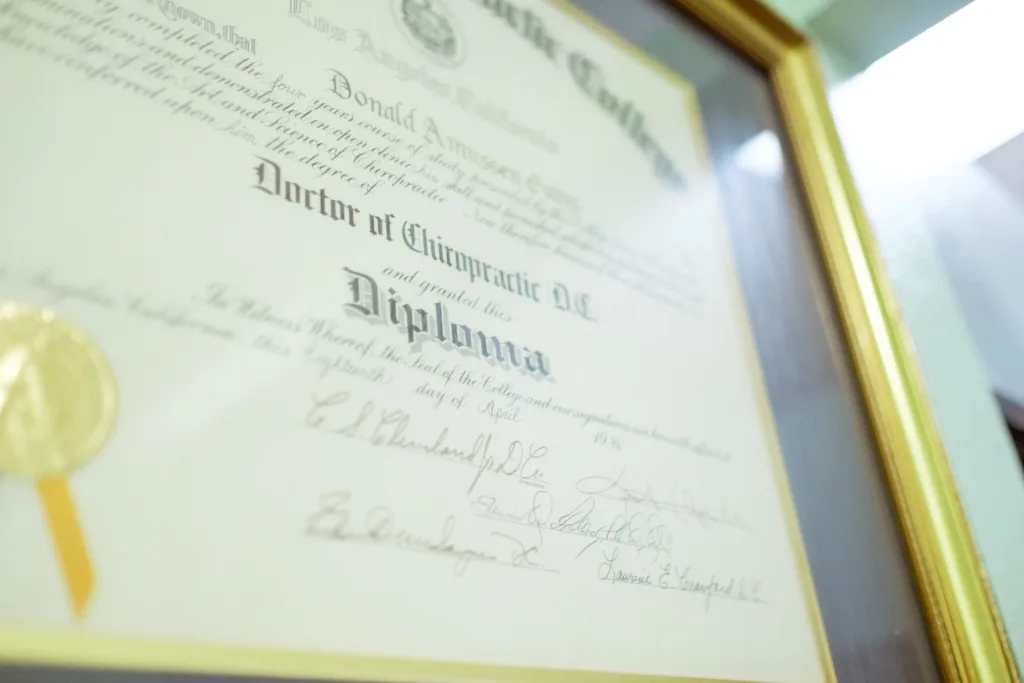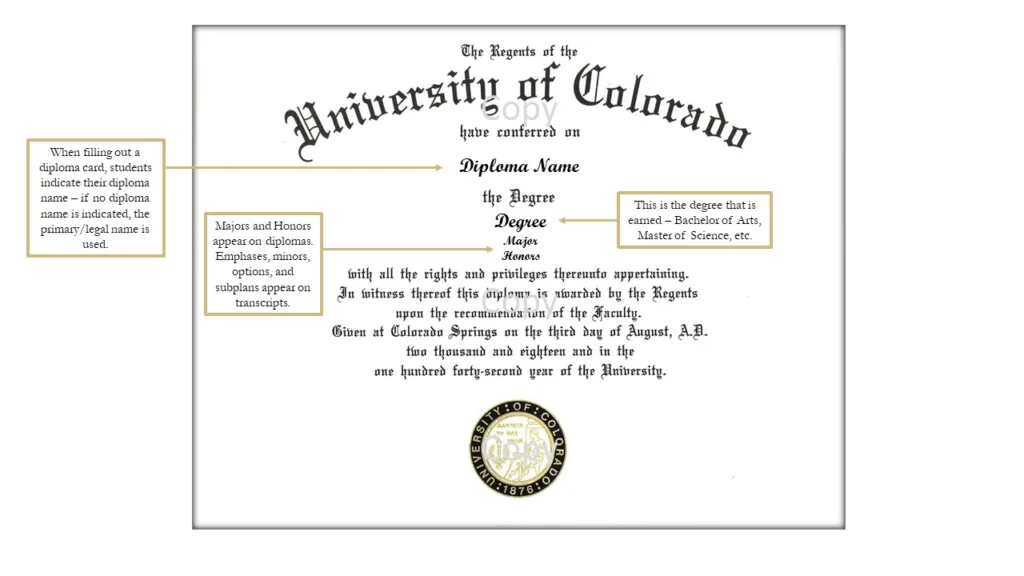When it comes to earning a degree, there are a lot of different components to consider. One of the most important is the diploma, which serves as a physical representation of all the hard work you put in over the course of your college career. But what about minors? Do they show up on your diploma? Let’s take a closer look.
First and foremost, it’s important to understand what a minor actually is. Essentially, a minor is a secondary area of study that you pursue in addition to your major. While your major is the primary focus of your degree program, a minor allows you to explore another subject area in greater depth or add a complementary skillset to your education.
So, do minors show up on your diploma? The short answer is no. Diplomas typically only list your primary degree and major. However, that doesn’t mean that your minor is insignificant or unimportant. In fact, your minor can be a valuable asset when it comes to your future career prospects.
While your diploma may not list your minor, it will show up on your academic transcript. This is a detailed record of all the courses you took and grades you earned throughout your college career. When you apply for jobs or graduate school programs, employers and admissions committees will often request a copy of your transcript in addition to your diploma. This means that even though your minor isn’t listed on your diploma, it can still be a valuable credential to have.
So, why pursue a minor in the first place? There are a few different reasons. For one, a minor can show that you have a diverse range of skills and interests, which can make you a more well-rounded candidate for jobs. Additionally, a minor can allow you to explore a subject area that you’re passionate about but may not want to pursue as a full-time career. Finally, a minor can provide you with a specific skillset that may be valuable in certain industries or positions.
Overall, while minors don’t show up on diplomas, they can still be an important part of your college education and future career prospects. Whether you choose to pursue a minor or not, it’s important to understand the vlue of a diverse range of skills and interests, and how they can benefit you in the long run.
Including Minor on Diploma
No, typically a diploma only displays the degree that you have earned, not any minors that you may have completed. The diploma is a legal document that certifies your successful completion of the requirements for your degree program. However, you can still provide evidence of your minor by providing your college transcripts to prospective employers or graduate schools. Your transcripts will show all courses you have taken and any degrees or minors you have earned.

Why Is My Minor Not Listed on My Diploma?
Your minor does not show up on your diploma because a minor is considered to be a secondary area of study and not the primary focus of your degree program. A diploma is a formal document that signifies the completion of your primary degree program, which is the major you chose to pursue.
However, your minor will be noted on your academic transcript, which is an official record of all the courses you completed durig your time at the university. Your transcript can be used to demonstrate to potential employers or graduate schools that you have additional knowledge and skills in a particular area of study.
It’s also important to note that if you have completed a double major within a single school, you will be awarded one degree and issued one diploma, which will list both majors. But in the case of a minor, it is not considered significant enough to be listed on your diploma.
The Impact of Having a Minor on an Individual
Yes, having a minor can make a difference in several ways. Firstly, a minor can make you a more well-rounded candidate for job opportunities as it showcases additional skills and knowledge outside of your major. This can make you stand out in a competitive job market.
Secondly, a minor can give you a competitive edge in your field as it provides you with a deeper understanding of a related subject. For example, if you are majoring in journalism and minoring in public relations, you will have a beter understanding of how to communicate with the public effectively.
Thirdly, having a minor can also open up more career opportunities for you. For instance, if you have a major in psychology and a minor in business, you can apply for jobs in both fields, such as human resources or organizational development.
Overall, having a minor can make a difference in your career prospects and provide you with a more well-rounded education.
The Impact of Minors on Society
Yes, minors do matter when it comes to a college education and future career opportunities. While majors are the primary focus of a college education, minors can be equally important in demonstrating a student’s interests and skills to potential employers. Minors can also provide a student with a more well-rounded education and can complement their major by providing additional knowledge and skills in a related field. Additionally, some careers may require or prefer candidates with a certain minor, so it’s important to research and cosider potential minors that could benefit one’s career goals. Overall, while minors may not be the main focus of a college education, they can still play a significant role in a student’s future success.
What Does a Diploma with a Minor Look Like?
A diploma with a minor looks similar to a regular diploma that displays the degree earned, such as a bachelor’s or master’s degree. However, the minor completed by the student is usualy not indicated on the diploma itself. Instead, the minor will be listed on the official transcript of the student’s academic record. The transcript is a document that outlines the courses taken and grades received during the student’s academic career, including any minors or specializations completed. Therefore, if a student has earned a minor in addition to their major, it is important to request an official transcript from their college or university to showcase their academic achievements.

Including a Minor on a Resume
Yes, you should list your minor on your resume. While your major is typically the most important aspect of your education, including your minor can proide additional context and highlight your areas of expertise. It can also demonstrate to potential employers that you have a diverse skill set and a willingness to learn and specialize in multiple areas. When listing your minor on your resume, make sure to format it clearly and consistently with your major, either on the same line or one line below. By including your minor on your resume, you can present a more complete picture of your education and qualifications, which can help you stand out to employers.
The Benefits of Pursuing Grad School as a Minor
Yes, having a minor can be beneficial when applying to graduate school. While your major is the primary focus of your application, a minor can demonstrate additional knowledge and skills in a related field. It can also show that you have a well-rounded education and are able to balance multiple areas of study. Additionally, if your minor is in a field that is related to your intended graduate program, it can demonstrate a focused interest and dedication to that subject. However, it is important to note that having a minor alone may not significantly impact your chances of being accepted into a graduate program. It is just one factor among many that admissions committees consier when evaluating applicants.
The Absence of a Minor on My Degree
Your degree typically does not say your minor because a minor is not considered a separate degree or a major area of study. A minor is usually a secondary field of study that requires fewer courses than a major but alows you to explore a specific subject in more depth. It is essentially a concentration of curriculum content that complements your major. While your minor is noted on your transcript, it is not typically included on your diploma since diplomas are awarded for completed degrees. Therefore, your diploma will only reflect the major that you completed and not your minor. However, you can include your minor on your resume or job applications to highlight your additional area of expertise.
The Benefits of Pursuing a College Minor
Yes, college minors can be very useful for students. While a major provides students with in-depth knowledge and skills in a specific field, a minor offers additional knowledge and skills in a related or complementary area. This can make students more well-rounded and competitive in the job market, as they have a broader range of expertise. Additionally, having a minor can demonstrate to employers that a student is passionate and committed to learning beyond their major, which can be an attractive quality. Many minors also offer valuable networking opportunities and hands-on experiences, which can further enhance a student’s resume and career prospects. Therefore, pursuing a minor in college can be a wise decision for thse looking to expand their skill set and increase their job opportunities.

Do Employers Consider Your Minor When Making Hiring Decisions?
When it comes to evaluating job applicants, most hiring managers do not explicitly look for specific minors or majors. However, employers do value the breadth and depth of learning that applicants have gained during teir academic studies. According to a 2021 survey from the American Association of Colleges and Universities, employers prioritize candidates who possess a well-rounded education and have developed a range of skills and competencies.
Having a minor can demonstrate to employers that an applicant has pursued additional areas of interest and has gained knowledge and skills beyond their primary field of study. For example, a candidate with a major in computer science and a minor in business may be more attractive to employers seeking individuals with both technical and business expertise. Similarly, a candidate with a major in psychology and a minor in sociology may be viewed as having a broader understanding of human behavior and social dynamics.
Overall, while a minor may not be a make-or-break factor in the hiring process, it can certainly be a valuable asset that sets a candidate apart from others. Employers appreciate individuals who have invested in their education and demonstrated a commitment to learning and personal development.
The Most Beneficial Minors for Students
Choosing a minor can be a significant decision that can impact your academic and professional future. With that in mind, the most useful minors can depend on the individual’s interests, career goals, and degree programs. However, some minors are highly relevant and can offer valuable skills and knowledge to students across different fields.
Creative Writing is an excellent minor for students who want to develop their communication skills and creative thinking. This minor can open doors to various careers such as journalism, publishing, or even screenwriting.
Multimedia Journalism is another highly relevant minor in the new decade. It provides students with the skills to produce content for digital platforms and social media, preparing them for the fast-changing media landscape.
Urban Studies/Planning is a minor that can lead to various career paths, such as city planning, transportation, and real estate. As urbanization continues to increase worldwide, this minor can provide students with the skills to tackle urban issues and create sustainable and livable cities.
Environmental Science is an increasingly important field, and a minor in this area can prepare students for careers in environmental regulation, sustainability, and conservation.
Queer Studies is an interdisciplinary minor that explores the history, culture, and politics of the LGBTQ+ community. This minor can be beneficial for students interested in social justice, human rights, and advocacy.
African (or Africana) Studies is a minor that examines the history, culture, and traditions of Africa and the African diaspora. This minor can provide students with an understanding of African societies and their global impact, preparing them for careers in international relations, education, or cultural preservation.
Finally, Business is a versatile minor that can complement any degree program, prviding students with the fundamental knowledge of finance, accounting, marketing, and management. This minor can open doors to various careers in the corporate world, entrepreneurship, or nonprofit organizations.
In summary, the most useful minors depend on the student’s interests, goals, and degree program. However, minors in creative writing, multimedia journalism, urban studies/planning, environmental science, queer studies, Africana studies, and business are highly relevant and can offer valuable skills and knowledge in the new decade.
The Easiest Minor to Pursue in College
When it comes to determining the easiest minor in college, it’s important to note that the difficulty level of a minor can vary depending on the individual’s interests and strengths. However, there are some minors that tend to have lower weekly workloads and higher average GPAs among enrolled students, making them perceived as easier options.
One such minor is Business Administration. This minor typically covers topics such as accounting, management, and marketing, and can be a good fit for students who enjoy working with numbers and analyzing data. Business administration programs tend to have a lower workload compared to other majors, with fewer heavy reading assignments and less time spent on research and writing.
Another minor that is often considered easy is Psychology. This minor focuses on the study of human behavior and can be a good fit for students who are interested in people and their motivations. Psychology courses tend to be more discussion-based, with less emphasis on memorization and more on critical thinking.
Education is another minor that is often seen as easy, especially for students who are considering a career in teaching. Education courses tend to be more practical and hands-on, with less emphasis on theory and more on real-world application.
Other easy minors include Public Relations & Advertising, whch covers topics such as branding, marketing, and media relations, Journalism, which focuses on writing and reporting skills, and Communications, which studies the way people communicate with one another.
Ultimately, the easiest minor in college will vary from student to student, depending on their interests and strengths. It’s important to choose a minor that aligns with your goals and passions, rather than simply selecting one based on perceived difficulty level.

Conclusion
In conclusion, a diploma is a physical document that serves as proof of completing a particular degree program. It is awarded to students upon successful completion of their coursework and requirements. While diplomas do not usually include information on minors or specializations, students can provide transcripts to prospective employers to demonstrate their additional areas of study. Obtaining a diploma is an essential step in securing a job in today’s competitive job market. It signifies that an individual has the necessary knowledge and skills to succeed in their chosen field. Therefore, it is crucial for students to prioritize their education and work towards earning their diploma, which can open doors to various career opportunities.
